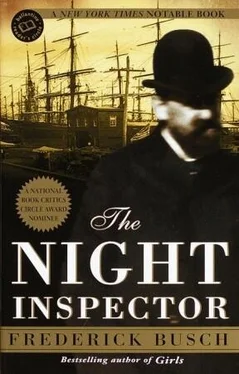Malcolm untied the sack and retrieved the pistol.
“It’s loaded,” I said.
He looked at me with something like fear tinged with merriment. I watched his father sip wine and I saw his wife attend the sipping.
“Perhaps,” I said, “after dinner, if your mother agrees, I will show you how to be safe with it.”
“Guns are for not being safe,” the boy said loudly, reminding me now of the fellow whom he was in Mrs. Hess’s house. I wondered that he did not recall me, and then I wondered that he drank himself so drunk that he could not recall me, yet had not given his father a hint, so it was said, of his fondness for the stuporous state.
“Sir, guns are for making others unsafe; for the fighting man, they are to be feared.”
Elizabeth instructed him to place the weapon on the floor. His father nodded like a magistrate, and the young man, looking younger, removed the weapon from the table.
We discussed the muddy print on the wall behind me — a souvenir of Liverpool, I was told. We spoke of Miss Ravenel’s Conversion , which he had not read, but of which, as a slight and popular thing, he disapproved. Elizabeth described for me her husband’s family’s land up the Hudson, where her daughters were, and then we chatted of her native Massachusetts. I had known men from New England in the War, especially some Vermont marksmen of Berdan’s Greencoats, and a fellow from Maine whose life had been saved at Gettysburg, he claimed, by a collapsible tin cup that he kept in his breast pocket.
“He carried it as a talisman until the end of the War. But wars are nothing, in the end, but stories,” I said. “Who knows which of them is true? Who knows which details, likewise, of the wars themselves?”
“There is the great historical cement that holds the stories together,” M said. “It is the mucilage of the underground dead, do you not think? So many of them, Southern and Northern. The ghastly expense of life in a waste of— I was going to say ‘shame.’ Do you think it shameful, Bill?”
“Which ‘it’?”
“The dying. The killing. Drummer boys and generals, President Lincoln, the bakers and the cooks and the quartermasters.”
“I should like to hear from someone like yourself that the men still breathing, after Grant accepted the Confederate sword, were worthy of concern, much less such tears as you propose we shed.”
“You feel ill-served by such remembrance?”
“No. I share its emotions with you. As to how I feel, with regard to public concern, I am unaware of any to be registered. We are absorbed, as best we can be, into our populace. There are many such as I to be resented for reminding our brothers and sisters at large that such a war took place and that such men had the misfortune to survive it.”
“You are not resented!” the boy said, slapping the table. “You are reverenced.”
“It seems to me,” his father said, “that some of that populace has spoken.”
“I thank you one and all.”
“Such dry wit virtually squeaks,” Elizabeth said. “Perhaps you will allow my husband to moisten it.”
Her grave voice and darting, dark eyes, her ready wit, had me smiling. I gave the gruff male equivalent of a titter so that she might know my appreciation.
In fact, the fellow from Maine had been shot right through his folding tin cup, and he had died with lung blood bubbling on his lips and with the metal of the cup inside his chest.
M, I found, had been staring at my veil, as though to better see my thoughts. His small, weak, expressionless eyes could take on the appearance of prescience I associated with the Egyptian Sphinx, and I found him unsettling. He drank a good deal more of the bitter wine he had served, and we ate mutton that was bathed in something like horseradish and accompanied by very dry, hard greens. I was inspected as I ate by the man who had fallen from close to the sun. I was the object of speculations by the man who had made a book about a whaling voyage sound like the Holy Bible itself. And here he sat, a federal employee of small matter with a son determined to be killed in the Indian wars, and a wife who badgered him first, I felt, before he might badger her.
He nodded, as if he had been addressed, and he set down his forkful of meat with a violent gesture, as if the food offended him. Then he clapped his hands twice and smiled like a great cat at his son.
“Oh,” his wife said, as if about to warn me.
Her husband clapped his mysterious applause once more and said, very loudly, “I like this good man!”
“Yes, Pa,” Malcolm said. The boy sipped, as children are required to, from a goblet of water. His father drank down wine.
M said, “He brings into the rooms of our house, the mortgage of which is paid off, I might say, with my wife’s largesse of resource and spirit, a kind of memento mori . And even though we break bread and chew and chew and chew at mutton, we are fortunate to be reminded of what I have called the charge through the hauntedness.”
I saw that Elizabeth had hung her head and so had Malcolm. Evidently, they were accustomed to but not reconciled with such an apparent welling of emotion as this.
“We should be grateful,” M said, “and we should be drinking . I propose a toast.” He raised his glass, and so did they, then so did I. “To William Bartholomew, soldier, warrior, deliverer of bleak truths. To wit”—I tired of holding my glass aloft, particularly in my own name, and I brought it down; the others, in a strange obedience, held theirs in the air—“the churches are by and large occupied by scoundrels and cowards; the libraries are by and large occupied by frauds, villainies, and the language of spun sugar; the newspapers are filled, by and large, with canards, lies, and self-congratulation.
“But, by damn, I wrong you, Bill. For, as is obvious to a man of education, I have placed in your mouth, as it were, the words I wish to speak. I have, and I pray you forgive me, written you. You’re a damned character of mine, and for that I must apologize. Though not overly. For I have given you harsh truths to convey. And truth, though with some it makes a wholesome breakfast, proves to all a supper too hearty. Hearty food, taken late, gives bad dreams. Do you say, Lizzie? Mal? Have I heaped upon this good, this finest, fellow a burden of truth too heavy to bear? Miss Ravenel’s Conversion , by the undergarments of both Saints Peter and Paul! And Hawthorne in his grave and me in mine.”
He shook his head slowly back and forth as it drooped toward the table. Elizabeth excused herself, gestured to Malcolm, and they began to clear.
“May I help, ma’am?” I asked her. But she affected not to have heard.
Her husband had. He said, “But you have helped, good fellow. We have spoken together of whales and cabbages and kings. Of Dutchmen and their papers, of poor Poe buried and remembered, and other scriveners buried and forgot.” His voice had grown softer, and he spoke now as though he had a sore throat. “You know, Bill, I am not unaccustomed to the minstrations of Dr. Charles Eliot Norton himself. He has called me mad. Poor fellow! I am but weary. I might sleep.”
Malcolm, returning to his place, said, “My father cannot always manage his wine.”
The father’s reddened eyes grew wide. His chin came up as if the end of his beard were a gunsight. He squinted down his face at Mal. “And you, sir,” he told him, “seem to know too much about such management. Or, anyway, to profess too much acquaintance with it.”
Mal held his stare, and I was astonished to watch his large, pale face seem to swell, as if it were a flower that opened before me. The boy’s lips, of a sudden, seemed thicker, and his nostrils more flared. Even the bones beneath his white cheeks gave the impression of broadening. Lizzie stood before her place at the table, gripping her napkin as if it were fastened to the solidity to which she needed, for safety’s sake, to hold. Her sad, sweet features seemed the face of a woman about to faint. The glow of perspiration I saw on Malcolm’s upper lip I also saw on his mother’s. His smile became a sneer, and I worried that father and son might fall upon one another.
Читать дальше












